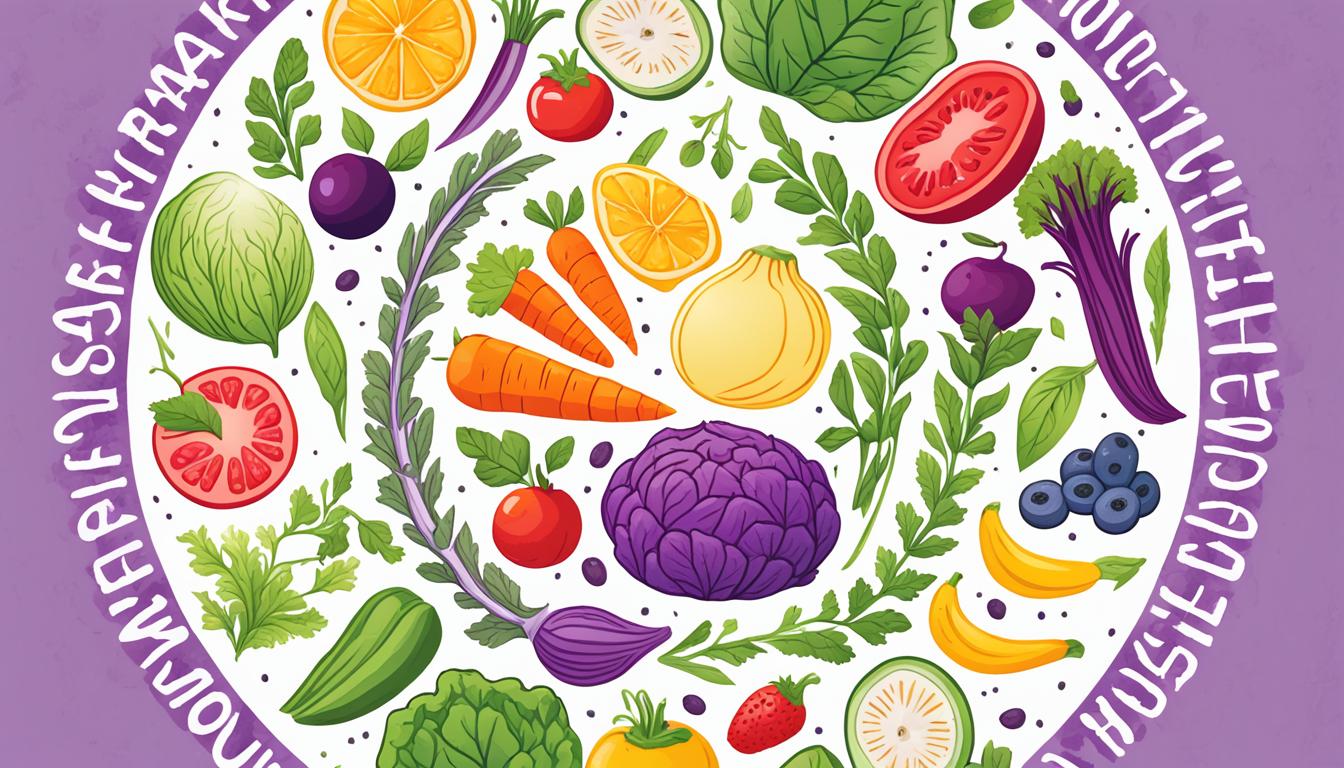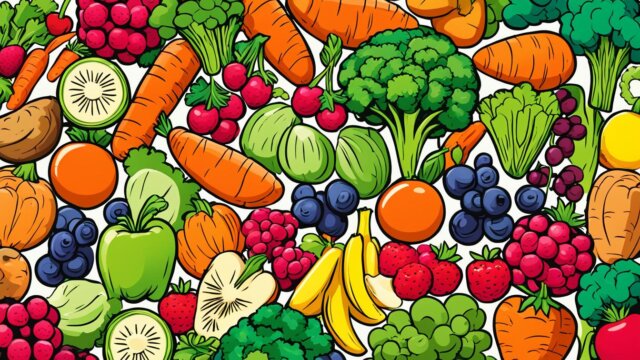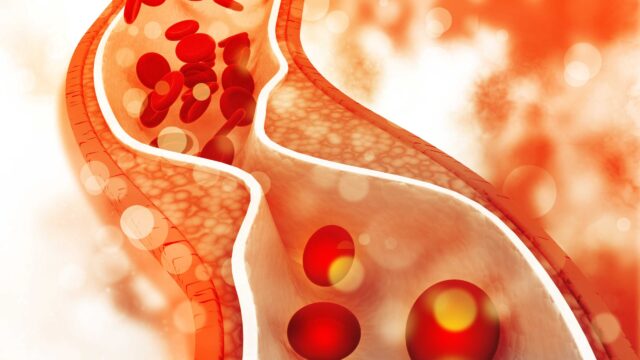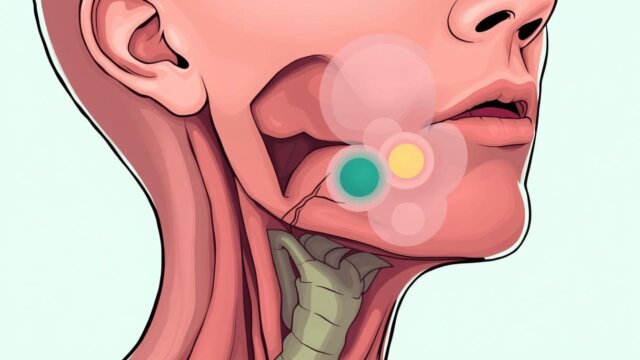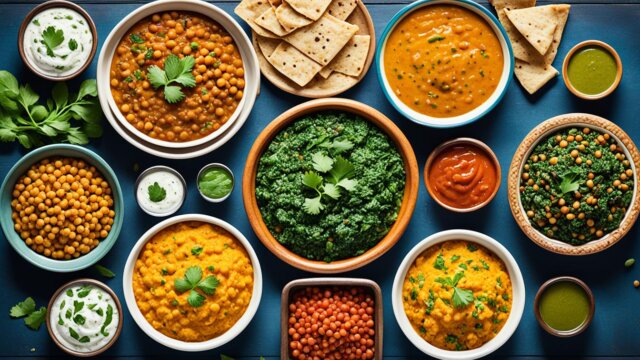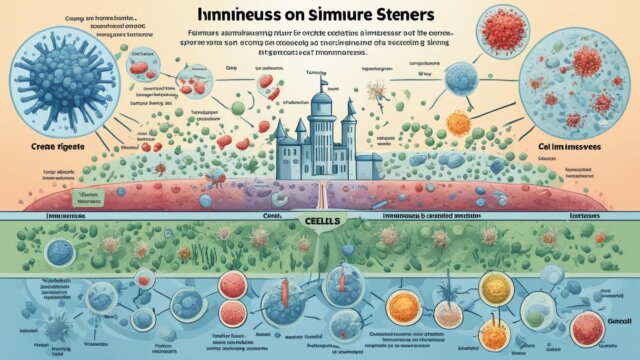FTC disclaimer: This post may contains affiliate links and we will be compensated if you click on a link and make a purchase.
Did you know that up to 11 probiotic-rich foods can be found in your local grocery store? Yogurt is a top choice and many people enjoy it. Adding yogurt and other probiotic foods to your diet supports your health. It can help your bones, heart, and stomach and lower diabetes and cancer risks.
Probiotics are good bacteria that help your body and mind. They make your stomach work better, lift your mood, and keep your heart strong. They also help your skin and fight off illness. You can add probiotics to your meals with supplements or eat fermented foods.
Key Takeaways
- Yogurt is one of the best sources of probiotics, offering a range of health benefits.
- Probiotic-rich foods like kefir, sauerkraut, tempeh, kimchi, and miso can also support a healthy gut.
- Fermented foods like kombucha, pickles, and natto are packed with gut-friendly probiotics.
- Incorporating a variety of probiotic-rich foods into your diet can promote a balanced gut microbiome.
- Consulting with a healthcare professional can help ensure the safe and effective integration of probiotic-rich foods into your lifestyle.
What are Probiotics and Why are They Important?
Probiotics are tiny living things that are good for you when you eat them. They help your body and even your mind in many ways. For example, they might make your stomach work better, help you feel less sad, keep your heart strong, and your skin looking good. You can find probiotics in pills or in foods that have been fermented.
Understanding the Gut Microbiome
The gut microbiome is packed with trillions of microorganisms in your gut. These tiny creatures do a lot for you, like digesting food, keeping you healthy, and maybe even helping your brain work better.
Benefits of Probiotics for Gut Health
Probiotics work wonders for your gut. They can help your stomach digest better, ease swelling, and make sure the good bugs in your gut are winning. Eating probiotics often might make your immune system stronger, help with how your body uses energy, and even lift your mood. Keeping your gut full of different healthy bugs is key for feeling good all over.
Importance of Maintaining a Balanced Gut Flora
Having the right mix of bugs in your gut is very important for your health. If the bugs in your gut are not in balance, you might have tummy issues, get sick more often, or have trouble with your weight. A rich, varied mix of gut bugs helps you digest food, use nutrients well, keep your immune system in line, and even stay mentally healthy. Eating foods with lots of probiotics is a smart choice to keep your gut’s bug community friendly.
Yogurt: A Classic Probiotic-rich Food
Yogurt is full of probiotics, making it a top health choice. It comes from fermenting milk with good bacteria. This process mainly uses lactic acid and bifidobacteria. Eating yogurt can help your bones, heart, and stomach work better.
It lowers the chance of getting diabetes and some kinds of cancer. Also, it helps you manage your weight better. People who can’t handle lactose might still do okay with yogurt. This is because the friendly bacteria in it change some of the milk sugar, called lactose, into lactic acid.
But, not all yogurt keeps these healthy bacteria alive. Processing can kill them. So, pick yogurt that says it has live cultures.
Types of Probiotic Yogurt
Probiotic yogurt has many good effects on health. It’s often fine for those who can’t have dairy, too. The live cultures in it work to better your digestion, fight off diseases, and keep you well overall.
Yogurt is a great way to get more probiotics. These good bacteria help your gut and your whole digestive system. The lactic acid these bacteria give off also helps people with lactose intolerance. It makes dairy foods easier for them to digest.
Benefits of Yogurt for Gut Health
Yogurt is packed with probiotics that are good for your gut. It balances the tiny world in your stomach and keeps your digestion healthy. The live cultures in yogurt do a lot for your digestion. They lower the risk of certain diseases and help you feel well all over.
Kefir: A Powerful Probiotic Beverage
Kefir is a special kind of drink made by fermenting milk. It gets its name from a Turkish word, “keyif.” This word means to feel good after eating. Kefir is good for your bones, helps your tummy work better, and fights off bad germs. Plus, if milk usually upsets your stomach, kefir might be okay for you.
Nutritional Value of Kefir
Kefir has many good bacteria and yeast. This makes it even better for you than yogurt. It is full of important vitamins and minerals like vitamin B12 and calcium. The way kefir is made helps your body use these nutrients more. This all helps your body stay healthy and your gut stay balanced.
Nutrient | Amount per 1 cup serving of low-fat kefir |
|---|---|
Protein | 9 grams |
Calcium | 24% of the daily value (DV) |
Phosphorus | 20% of the DV |
Vitamin B12 | 29% of the DV |
Riboflavin (B2) | 25% of the DV |
Magnesium | 7% of the DV |
Vitamin D | 12% of the DV |
Sauerkraut: A Fermented Delight
Sauerkraut is finely shredded cabbage that’s been fermented. It’s loved in many countries, especially in Eastern Europe. Fermentation is done by lactic acid bacteria. This makes sauerkraut full of good bacteria.
Traditional Sauerkraut Fermentation Process
Making sauerkraut only needs cabbage and salt. Its history goes back over 2,000 years to China, around 220 B.C.
Health Benefits of Sauerkraut
Sauerkraut is good for your gut. It’s also high in fiber and full of vitamins C and K. It has antioxidants for eye health too.
One cup of sauerkraut has 27 calories and many nutrients. This includes vitamin C, iron, and potassium. The fermentation process boosts antioxidants, adding more health benefits.
Each serving of sauerkraut has many types of good bacteria. These bacteria help your gut.
Sauerkraut’s Vitamin K2 is great for your heart. Probiotics can help with diarrhea from antibiotics. They might also help with weight control.
Sauerkraut’s fermentation might help stop certain cancers. It may lower the risk of breast, colon, liver, and other cancers.
The probiotics in sauerkraut can even reduce stress. They’re good for your brain. Vitamin K2 makes your bones stronger.
Choose non-pasteurized sauerkraut to keep the good bacteria alive. Avoid kinds with added sugar or preservatives for the best health benefits.
Adding sauerkraut to your meals, like salads and sandwiches, makes them tastier and healthier. It’s full of fiber for your digestion and weight.
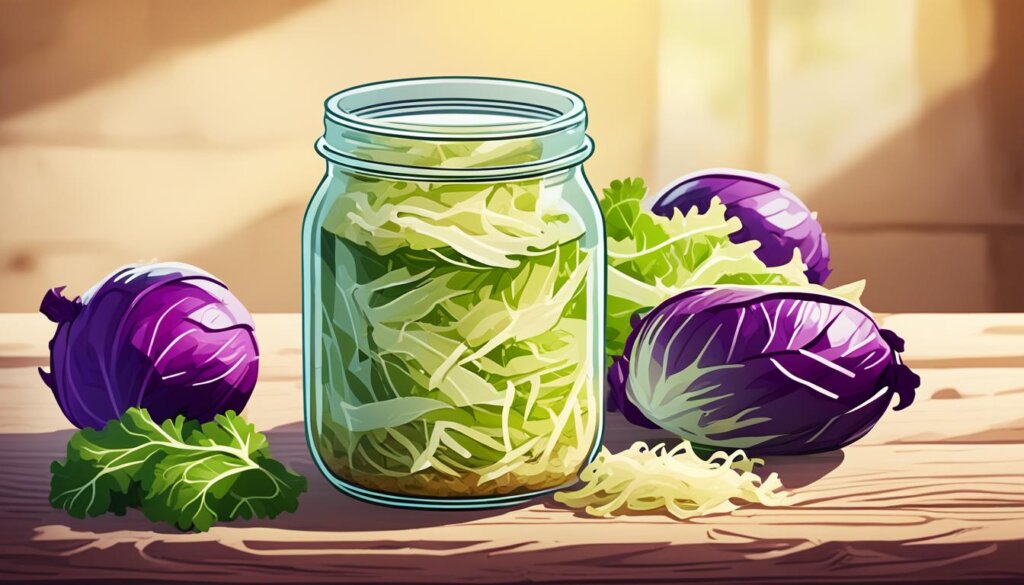
Tempeh: A Versatile Probiotic-rich Food
Tempeh is a firm patty made from fermented soybeans. It comes from Indonesia and is known worldwide as a meat alternative. Tempeh is high in protein, which is great for those who don’t eat meat.
The fermentation process changes its nutrition in surprising ways. It lowers the phytic acid content, which helps our bodies absorb iron and zinc better. Plus, it adds vitamin B12.
This is important for vegetarians because soybeans by themselves don’t have this vitamin. So, tempeh is a smart choice for a balanced diet.
Every 3-ounce (84-gram) serving of tempeh has: Calories: 162, Protein: 15 grams, Carbs: 9 grams, Total Fat: 9 grams. It also has Sodium: 9 mg, Iron: 12% of what you need each day, Calcium: 9% of your daily needs, Riboflavin: 18% of your daily needs, Niacin: 12% of your daily needs, Magnesium: 18% of your daily needs, Phosphorus: 21% of your daily needs, Manganese 54% of your daily needs. Plus, one cup (166 grams) of tempeh has 31 grams of protein.
Studies show soy isoflavones in tempeh help lower cholesterol. These isoflavones also work as antioxidants, reducing stress on our bodies. What’s more, tempeh is rich in calcium, which is good for our bones. The calcium in tempeh is as easy for our bodies to use as the calcium in milk. So, it’s a top pick for keeping our bones strong.
Kimchi: A Korean Probiotic Powerhouse
Kimchi is a spicy Korean side dish, known for being fermented. It’s often made with cabbage, but other veggies can be used too. Its key seasonings are red chili pepper, garlic, ginger, scallion, and salt. Through fermentation, kimchi gains good bacteria like Lactobacillus kimchii, which is great for your stomach.
Ingredients and Preparation of Kimchi
Creating kimchi at home is easy. First, gather your ingredients. Then, salt the cabbage for 2-3 hours and prepare a mixture of rice flour, water, and seasonings. The making of kimchi goes back thousands of years. Every Korean region has its own twist. Essential elements like garlic, ginger, and chili peppers add to kimchi’s healthy nature.
Probiotic Strains in Kimchi
Cabbage kimchi is full of probiotics, including Lactobacillus kimchii. These good bacteria can help your gut and digestion. The fermentation gives kimchi even more probiotic power, ideal for gut health. Kimchi has various beneficial bacteria, with Lactic Acid Bacteria being the most important.
Research shows that these bacteria, mainly from the Lactobacillus family, can better your digestion, fight bad bacteria, and lower inflammation.
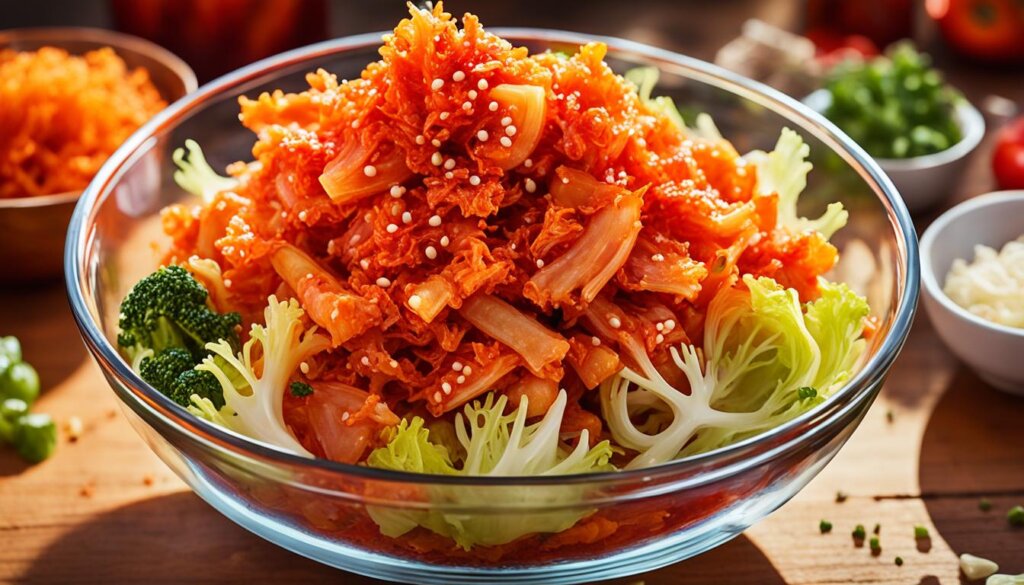
Nutritional Value of Kimchi (per 1-cup serving) | Amount |
|---|---|
Calories | 23 |
Carbs | 4 grams |
Protein | 2 grams |
Fat | less than 1 gram |
Fiber | 2 grams |
Sodium | 747 mg |
Vitamin B6 | 19% of the Daily Value (DV) |
Vitamin C | 22% of the DV |
Vitamin K | 55% of the DV |
Folate | 20% of the DV |
Iron | 21% of the DV |
Niacin | 10% of the DV |
Riboflavin | 24% of the DV |
Probiotic-rich Foods
Adding probiotic-rich foods to your meals can help your gut health a lot. You can find them in things like Japanese spices, fermented drinks, and pickles. These foods are filled with good bacteria. They can make your digestion better, help your body fight sickness, and boost your health in many ways.
Miso: A Fermented Soybean Paste
Miso is a seasoning from Japan. It’s made by fermenting soybeans with salt and a special fungus. This method makes miso high in protein, fiber, and many vitamins and minerals like vitamin K. Studies show it might help prevent cancer and heart disease and control cholesterol.
Kombucha: A Fermented Tea Drink
Kombucha is a drink from fermented black or green tea. It’s getting more popular worldwide, especially in Asia. Though we need more research to be sure, some studies hint that it might lower cancer and diabetes risks. Because of its fermentation, kombucha is good for your gut health due to its probiotics.
Pickles: A Crunchy Probiotic Snack
Pickles, also called gherkins, are cucumbers soaked in salt water to ferment. This gives them many healthy bacteria that can benefit your gut. They’re low in calories and have vitamin K too. But remember, pickles made with vinegar don’t have live probiotics in them.
Traditional Buttermilk and Other Dairy Sources
Buttermilk includes many types of fermented dairy drinks. The variety from making butter is called traditional buttermilk. It is from India, Nepal, and Pakistan mostly. This buttermilk is low in fat and calories. It provides important vitamins and minerals like vitamin B12 and calcium.
Benefits of Traditional Buttermilk
In India, Nepal, and Pakistan, people love traditional buttermilk. It has probiotics and is rich in vitamins and minerals. These include vitamin B12 and phosphorus.
Probiotic-rich Cheese Varieties
Not all cheeses with fermentation have probiotics. You should select cheeses with “live cultures” or “active cultures” on the label. There are more probiotics in semi-hard cheeses like cheddar, mozzarella, and cottage cheese. They have more probiotics than longer-aged cheeses. Cheese is full of nutrients, including protein and essential vitamins.

Natto: A Japanese Probiotic Superfood
Natto is a fermented soybean dish loved in Japan. It has a key bacterium, Bacillus subtilis, for gut health. High in protein and vitamin K2, natto is great for your bones and heart. A study in 2020 shows it helps prevent weak bone fractures in older women, highlighting its special qualities.
Nutritional Profile of Natto
In each 3.5-ounce (100-gram) serving, natto gives you 211 calories, 11 grams of fat, and 13 grams of carbs. It also has 5 grams of fiber and 19 grams of protein. With loads of nutrients such as manganese, iron, copper, and more, it’s a powerhouse food.
The vitamin K2 in natto helps keep our bones strong. It does this by aiding in calcium absorption. Plus, natto has fiber to lower cholesterol and an enzyme reducing blood clots, which helps with heart health.
Its good bacteria support digestion and boost your immune system. Thanks to B. subtilis, it may protect you from respiratory illnesses. Though, the health perks of natto, like fighting cancer or aiding weight loss, need more study.
Unique Flavor and Texture of Natto
Natto doesn’t just taste it’s also smell distinctive. It’s slippery and some say it tastes nutty or earthy. These qualities come from fermenting it with Bacillus subtilis bacteria.
Natto’s unique flavor may not be for everyone, but it’s a big part of Japan’s food culture. It’s an excellent source of probiotics too.
Incorporating Probiotic-rich Foods into Your Diet
Adding probiotic-rich foods to your meals every day is great for your gut health. You can add yogurt to breakfast, like overnight oats or smoothies.
For lunch or dinner, use sauerkraut or kimchi in dishes like soups and stir-fries. Also, kefir and buttermilk are good for baking or as a marinade.
Try tempeh or miso in vegetarian meals to change things up. Mixing up the sources of your probiotics boosts your gut’s health even more.
Tips for Meal Planning
Eating probiotic-rich and prebiotic-rich foods together is smart for your gut. Prebiotics work as food for the good bacteria in your gut. You can find prebiotics in onions, garlic, bananas, oats, and Jerusalem artichokes. Pairing these with probiotics makes your gut even healthier. This helps with your digestion.
Combining Probiotic-rich Foods with Prebiotics
Eating probiotic-rich and prebiotic-rich foods together is good for your digestive system. Prebiotics act as fuel for the good bacteria in your gut.
They’re in foods like onions, garlic, bananas, oats, and Jerusalem artichokes. When you eat these with probiotic foods, it helps your gut work well. This takes care of your digestion.
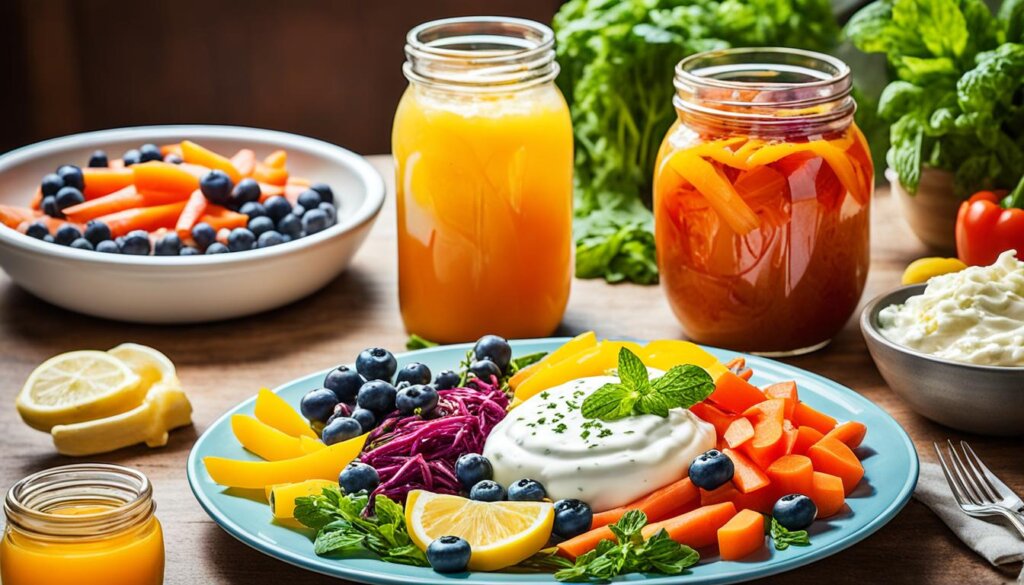
Precautions and Considerations
Probiotic-rich foods are usually safe for most people, but talk to a healthcare expert. This is important if you have health issues or take drugs. Some might feel gassy or bloated at first with more probiotic foods. A healthcare provider can help you add the right amount and kind of these foods to your diet safely.
Consulting with a Healthcare Professional
Eating probiotic-rich foods is generally okay and not harmful. Yet, some could feel a bit gassy or bloated, or have tummy trouble at first with these new foods. This could mean their gut is getting used to good bacteria.
It’s key to watch for how these foods might mix with your meds or health troubles, like weak immune systems or big allergies. Talking to a healthcare pro is smart for a smooth transition with these healthy eats.
Possible Side Effects and Interactions
Probiotic-friendly foods are normally safe and fine to eat. Still, a few may get gassy, bloated, or feel a bit off in their stomach when starting on them. This may mean their gut is adjusting to the new good bacteria.
Remember, these foods could affect your medicine or health issues like weak immunity or bad allergies. Getting advice from a doctor ensures you add these foods to your meals safely.
Conclusion
Eating a variety of foods rich in probiotics is great for your gut and health. The options are many, from yogurt and kefir to sauerkraut and kimchi. These foods are full of good bacteria. They help with digestion, make you less likely to get sick, and may even make you feel happier and think better.
Adding probiotic-rich foods to your meals and snacks is a smart move. It brings benefits to your gut and your whole body. But, talk to a doctor first. Some people might have issues with these foods at first.
Trying out fermented foods like yogurt and kimchi is fun. You can mix them with foods that help them do their job better. Things like onions, garlic, bananas, and oats work great. They make your gut a happy place.
By adding probiotic-rich foods to your diet, you’re giving your body a big gift. Feast on a variety of fermented foods. They will keep your digestive tract, immune system, and even mood in top shape. Making them part of your eating routine is key to a healthy life.
FAQ
What are probiotics and why are they important for gut health?
Probiotics are tiny organisms that help us when we eat them. They are good for our body and mind. These good bacteria do a lot, like helping us digest food better and making us less sad. They also keep our heart and skin healthy. Having lots of different good bacteria in our gut is key to feeling good all over.
What are the best sources of probiotics?
The best foods for probiotics are yogurt, kefir, and others. Foods like sauerkraut, kimchi, and pickles are great too. These foods are left to ferment, which means they’re full of live cultures. These cultures are the good bacteria that help our gut stay healthy.
What are the health benefits of eating probiotic-rich foods?
Eating foods rich in probiotics makes our gut happy. This leads to better digestion and less swelling. Our body can take in more nutrients and fight off sickness stronger.
Plus, probiotics might also help our brains work better and keep us in a good mood. They help keep our blood sugar levels in check too.
How can I incorporate more probiotic-rich foods into my diet?
It’s easy to eat more probiotic foods. Try mixing yogurt or kefir into your daily smoothie. Add sauerkraut or kimchi to your favorite meals. For stir-fries, use tempeh or miso. And don’t forget about kombucha; it’s a tasty drink that’s good for you.
Are there any precautions or considerations when consuming probiotic-rich foods?
Most people can eat probiotic foods without worries. But, if you’re not sure, talk to a doctor. Sometimes, a few people might get a little gassy or bloated when they start eating more of these foods. This is normal and often goes away on its own.
